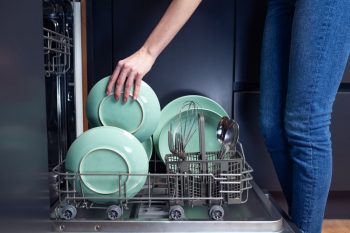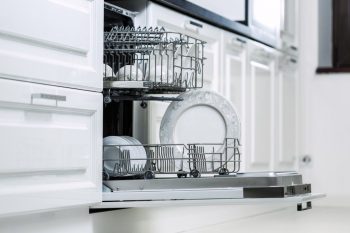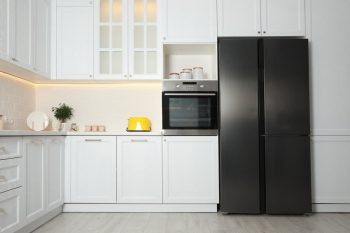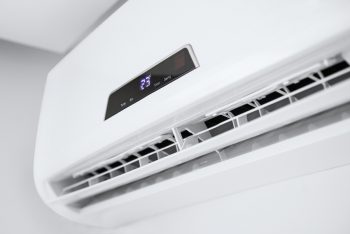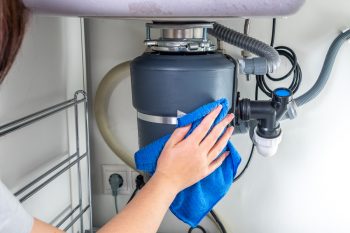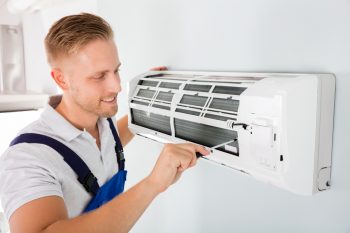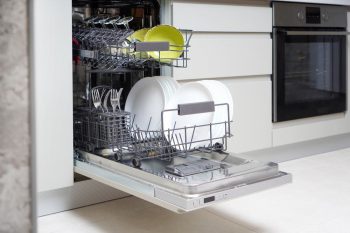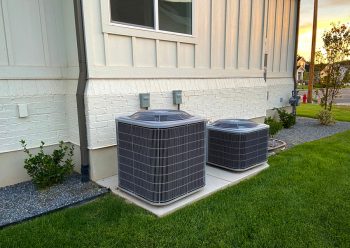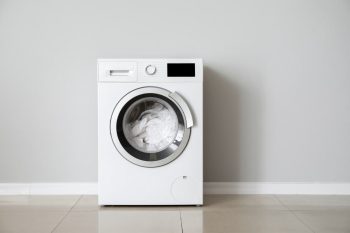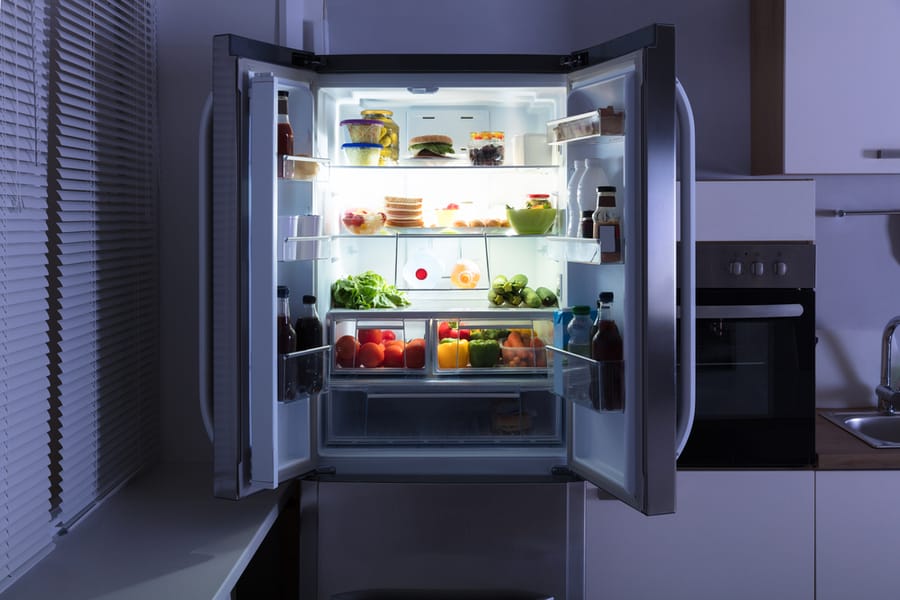
When running your refrigerator, hearing them make their signature humming sound is normal.
But then, when you hear an occasional gurgling sound, it should raise your eyebrows. So what is that noise, and why is the refrigerator gurgling?
Gurgling sounds in the refrigerator don’t always indicate trouble. We’ve got several reasons your appliance makes the sound; some are harmless and normal.
They include:
- Boiling freon.
- Refrigerant flow.
- Air in the drain tube.
- The flow of melted water.
- Leaky water supply lines.
The list is quite mixed up, ranging from harmless to a potential red flag. Therefore, always try to figure out the exact reason behind the noise for any corrective measures if necessary.
In today’s coverage, I’ll cover the five likely reasons for the gurgling sound coming from your appliance. I’ll even suggest a few troubleshooting tips. So, is that what you’ve been looking for? Well, let’s go and get started.
5 Reasons Refrigerators Make Gurgling Sounds
We all find gurgling sounds, whatsoever the source, quite annoying. And when it’s associated with an expensive appliance like the refrigerator, the urge to find out and eliminate the noise multiplies.
Here are the five possible causes of a refrigerator gurgling noise in detail:
1. Freon Boiling
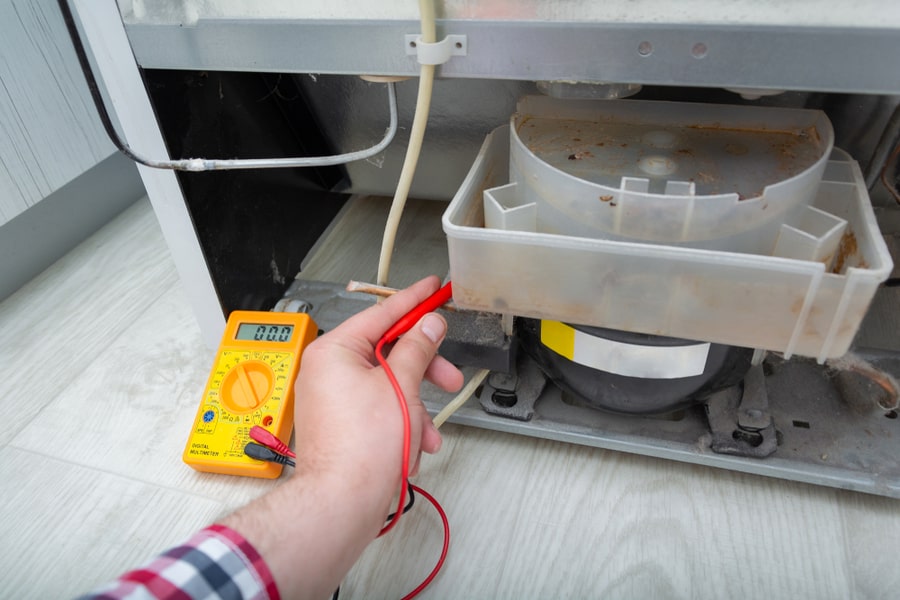
If your appliance uses Freon, sometimes the gurgling sound is part of the unit’s normal operations.
You see, a refrigerator works by capitalizing on the low boiling point of Freon – or any other refrigerant.
The refrigerant begins as a liquid before it’s pumped to the expansion valves by the compressor. Its boiling point is greatly reduced there, turning it from liquid to gas. It’s now the gas that helps cool whatever you have stored on the inside.
Now, it’s during the boiling process where the gurgling sound comes from. So it’s normal, and there’s absolutely nothing to worry about in this case.
“Boiling point” here doesn’t necessarily mean much heat is involved. Usually, the boiling point, or rather the evaporation of Freon, happens at a temperature as low as -29.8 degrees Celcius, almost a whopping 130 degrees Celsius less than the boiling point of water.
2. Air in the Drain Tube
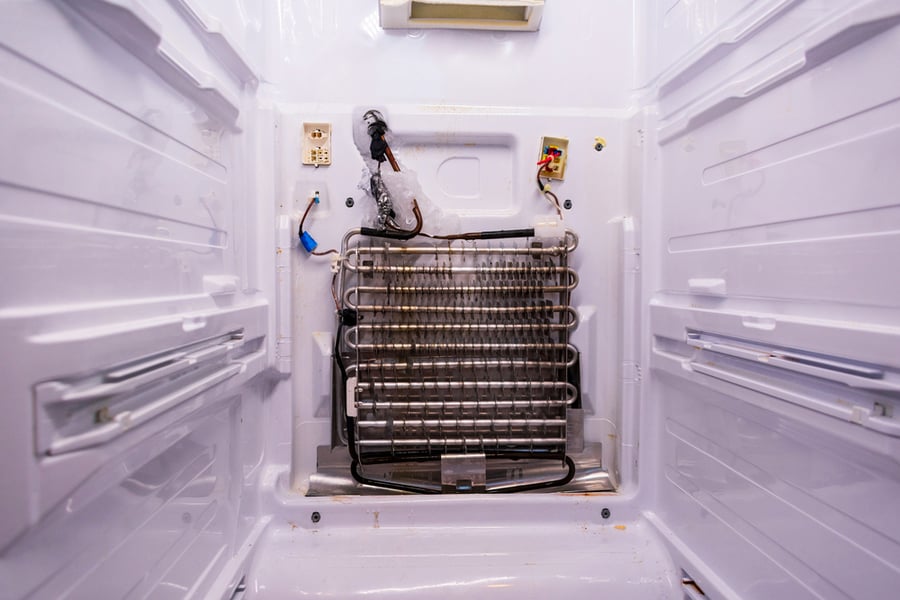
The drain tube conveys condensed water from the defrost cycle to a pan. The part is usually located at the bottom of the refrigerator.
When you open and close the refrigerator, air can force itself into this tube. That prompts water to equalize in the drain tube to restore things to their initial state.
As this process is happening, the air escapes through it with a gurgling sound. The noise can be very loud and annoying at times.
But in most cases, the unpleasant gurgling lasts for just a few seconds. If yours stays for longer, it’s likely something else causing is causing the problem.
3. Refrigerant Flow After Cooling Cycle
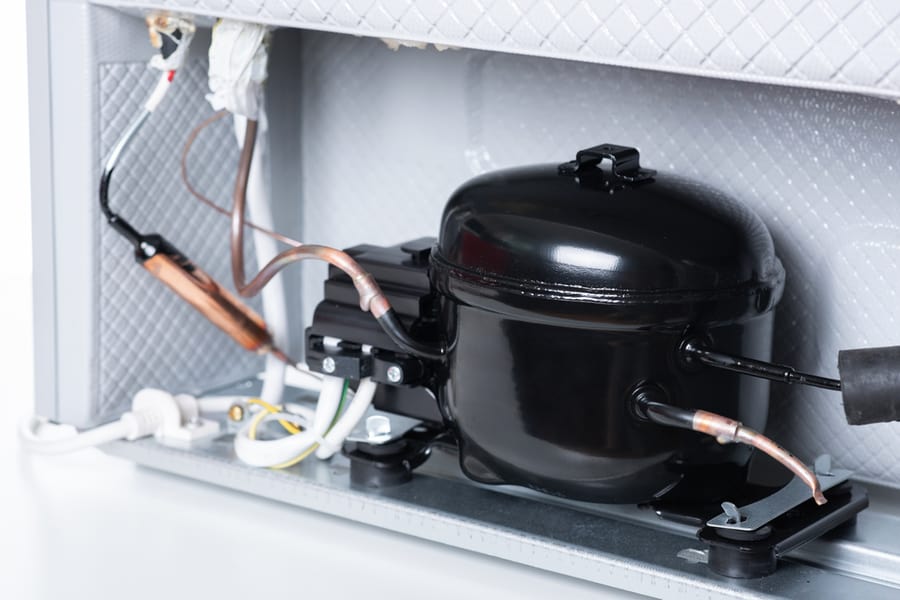
The refrigerant in your refrigerator will usually change from liquid to gas and back, depending on the cooling cycle.
The compressor is responsible for the circulation of the refrigerant and will add pressure to it depending on the current temperature and what’s needed.
The moment you open the refrigerator, you allow warm air to get in, forcing the compressor to work even harder to try and return things to a relaxed state. Unfortunately, this process often causes noise as the refrigerant flows through the tube.
Sometimes, the sound becomes more apparent immediately after the refrigerator shuts down after a cooling cycle. In that case, the refrigerant flows through the tubes, and it’s nothing to worry about.
4. The Flow of Melted Water
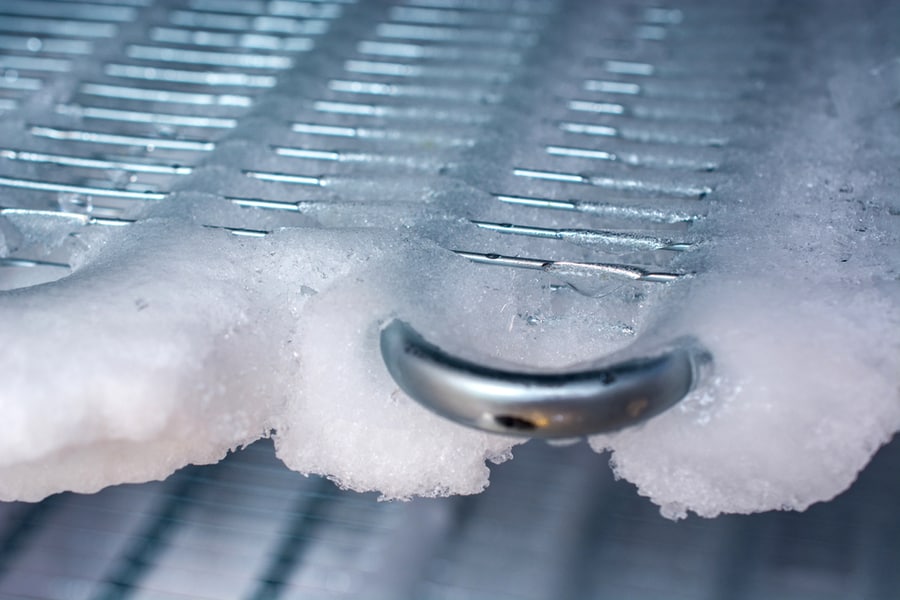
If your refrigerator has automatic defrosting, the gurgling sound may be coming from the flow of melted water.
This is usually when the defrost cycle runs, and all the melted water flows down to the drip pan for evaporation.
As this water flows through the drain tube, a gurgling sound becomes likely, and it’s normal in this case. The defrosting process lasts for about 30 minutes.
That’s to say, if you can still hear the gurgling sound after that period, it’s likely coming from something else.
5. Leaky Water Supply Line
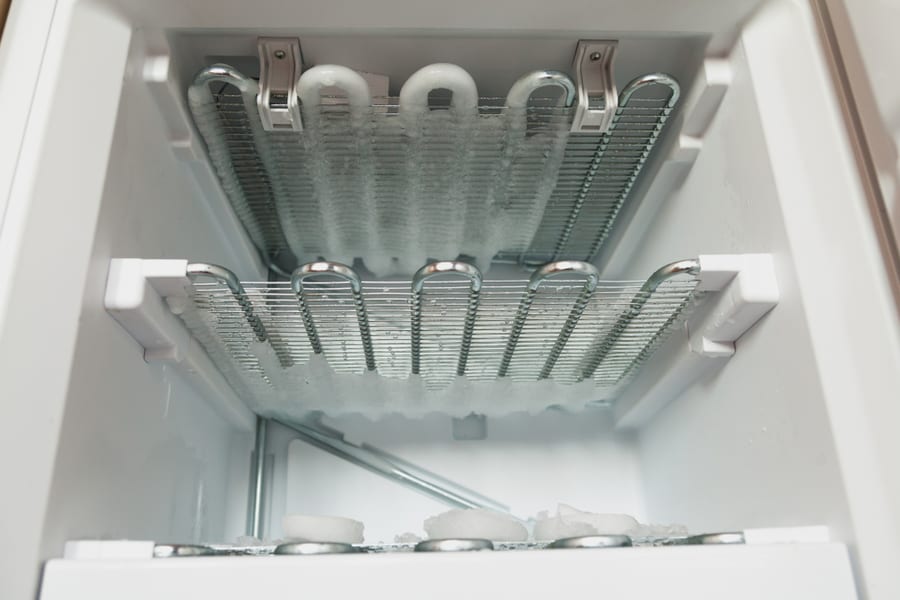
Last, a leaky water valve could be the culprit behind the annoying gurgling sound.
The valve is used to supply water to the refrigerator for cold and refreshing drinks or ice cubes.
The problem with a leaky valve is that it makes it possible for air to find its way into the pipe, especially when the appliance is pulling water. The pockets of air often result in annoying gurgling noise.
Where a leaking water supply line is the culprit, you may also see other signs of water leakage. For instance, you may notice water puddles on the floor, but that depends on the puncture’s size on the water supply line.
You may also notice a decline in the water flow rate, which will usually become more apparent when you try dispensing water from the fridge.
How To Fix the Problem
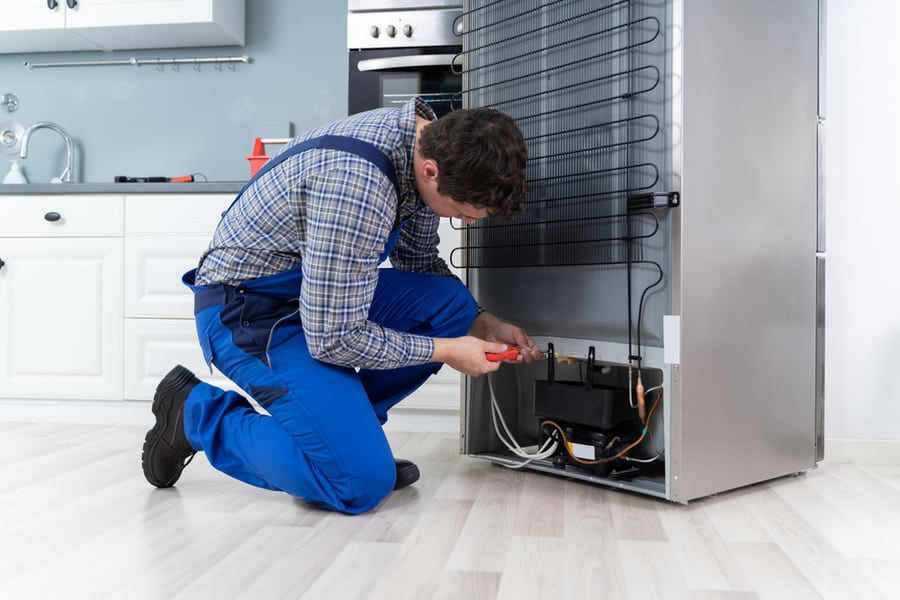
If your diagnosis suggests that the gurgling isn’t coming from the normal operation of your refrigerator, then you’ll need to put in place the appropriate measures.
As long as you know what you’re doing, fixing some of these issues is possible.
1. Get a New Water Supply Line
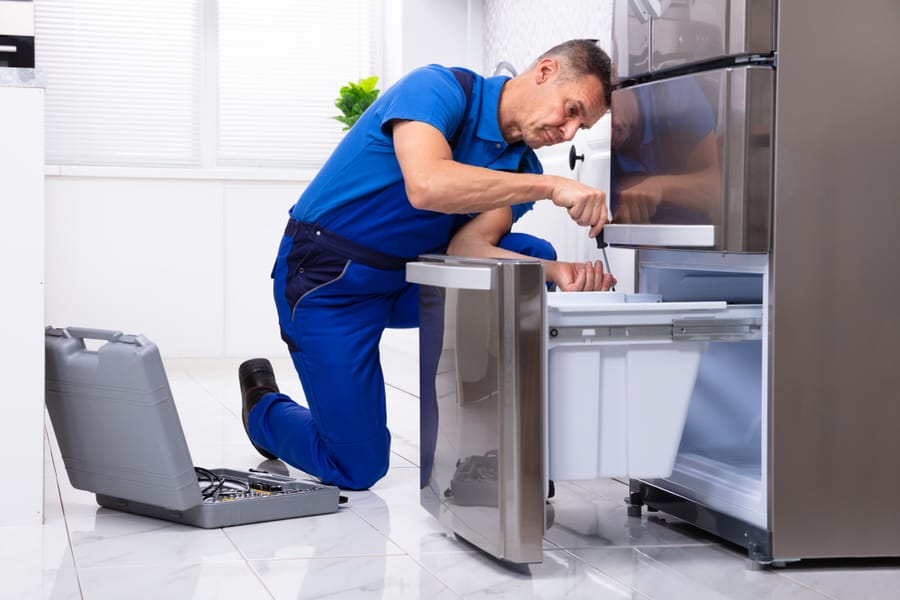
Where the water supply line is leaking, replacing it with a new one will help fix the issue. This is usually a straightforward process that you can do yourself if you have the right supply of tools and know-how.
Here’s What You Need
Ensure that you have the following before beginning your DIY adventure:
- Two adjustable wrenches.
- New water supply tubing.
- Flat-blade screwdriver.
- 1/4-inch nut driver.
Procedure
If you choose the DIY route, here are the steps to follow:
Step #1: Turn Off the Water Supply
The first step is to shut off the water supply line and drain any remaining water. You can do this by going ahead and disconnecting the water supply line from the valve under your kitchen sink.
Then, run the faucet to remove water from the old tube.
You must unplug your refrigerator from the power source when replacing it. That will save you from unnecessary shocks due to any unexpected flow of electricity.
Step #2: Remove the Old Water Supply Line
Next, adjustable wrenches disconnect the old line from the appliance and the wall. You may first have to remove the dispenser’s front panel and disconnect the wiring harness.
Also, some refrigerators have a water line mounting bracket which you must get out of the way.
Step #3: Disconnect the Old Water Line
Using a wrench, unless necessary, then detach the old water line from the dispenser’s spigot. Then, access the outer water line and depress its tabs. That releases the water line from the coupler.
Step #4: Remove the Old Water Line
Once you’ve disconnected the water line, you can remove it. You can do that by pulling it.
The rule of thumb is to pull it up from the highest point. So, if the water line enters the refrigerator through the bottom, pull it from the dispenser.
However, you’ll have to pull it from the top if it gets into the refrigerator through the top.
Step #5: Install the New Water Line
You’ve removed the old water line. Next is to install the new tubing. Run the tube from the point at which you did the pulling.
If from the top, run the new tube right from that point. The same applies to the bottom. Then, insert the new tubing into the dispenser’s spigot.
Step #6: Connect the Outer Water Line
At this point, you have to connect the outer water line. Then, with the coupler firmly in place, insert the other end into the water supply line. Then, press the tabs back in to secure the tubing firmly in place.
If the water line is longer than necessary, cut the extra length. Use a sharp utility knife for the work and make a straight cut.
The extra length of the hose is unnecessary and may even slightly interfere with the effective working of the unit.
Step #7: Reconnect the Water Supply Line
Once all connections are firmly in place, return all the parts to their place. For example, if you have removed the front panel of your dispenser, screw it back.
Then, reconnect the water supply line to the valve under your kitchen sink.
Step #8: Test the Connection
After all this, it’s time to test the new connection. First, turn on the water supply line and check for any leaks. If everything is good, you can now plug in the refrigerator.
Otherwise, check the connection again and ensure everything is firmly in place.
2. Reduce the Number of Trips to the Refrigerator
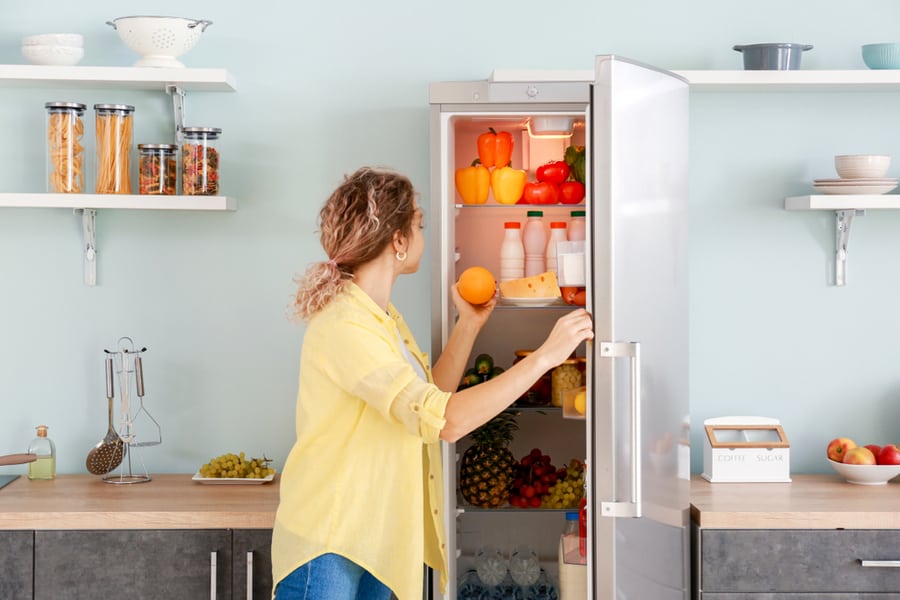
The other way to avoid the gurgling noise is to reduce the number of trips to your refrigerator. Yes, walking to your fridge more often could be the reason for that annoying sound coming from it.
When you open the refrigerator door, cold air escapes and is replaced by warmer air from outside your home. That forces the compressor to put more effort into cooling things back, which may cause gurgling sounds.
Cutting down on the door openings helps reduce this problem. Plus, it will save you some cash in electricity bills in the long run. Plus, it will minimize the instances whereby air has to be forced into the drain tube.
3. Seek Professional Help
If, after all these steps, you still hear the gurgling noise, or don’t know how to fix it yourself, then it may be time to seek professional help.
A qualified technician can check the drain tube and other components to identify any issues causing the noise.
Conclusion
The gurgling sound from your refrigerator doesn’t always have to indicate anything serious. Sometimes it’s natural and part of the core processes happening in there.
However, it could also point to underlying problems with your refrigerator, such as a leaking water supply, and that’s why you shouldn’t always ignore it.
When you suspect your unit’s gurgling sound isn’t normal, take the right steps to identify and solve the problem. Following the tips discussed here should help you fix the problem.
And yes, you can always seek professional help if the DIY route does not do the trick.
Frequently Asked Questions
How Can I Stop My Refrigerator From Making Noise?
You can’t stop the refrigerator entirely from making noise, but you can reduce the noise. To do this, make sure your refrigerator is on level ground.
Using acoustic treatments, you can also try hanging temporary sound barriers or soundproofing the area around the refrigerator.
When Should I Worry About My Fridge Noise?
You should worry about your fridge noise if it comes along with other signs likely to suggest a problem, such as temperature issues, leaking, or strange odors. In this case, it’s best to seek professional help from an expert technician.
Is It OK That the Fridge Is Making a Sound?
Yes, it’s generally OK if the refrigerator is making noise. A certain amount of noise is normal as it works to maintain its temperature and keep your food cold.
However, if the noise is louder than normal or accompanied by other signs, it could suggest a problem. In this case, it’s best to call an expert technician.

